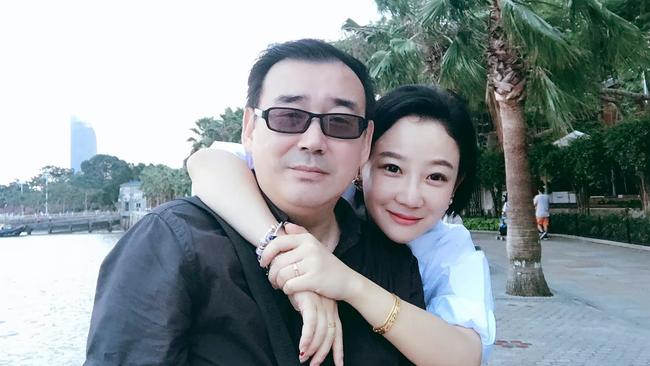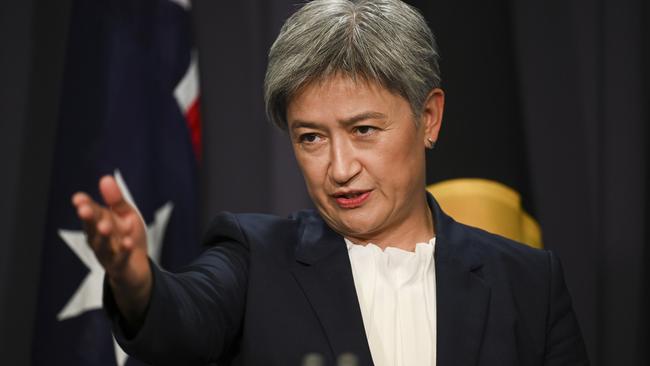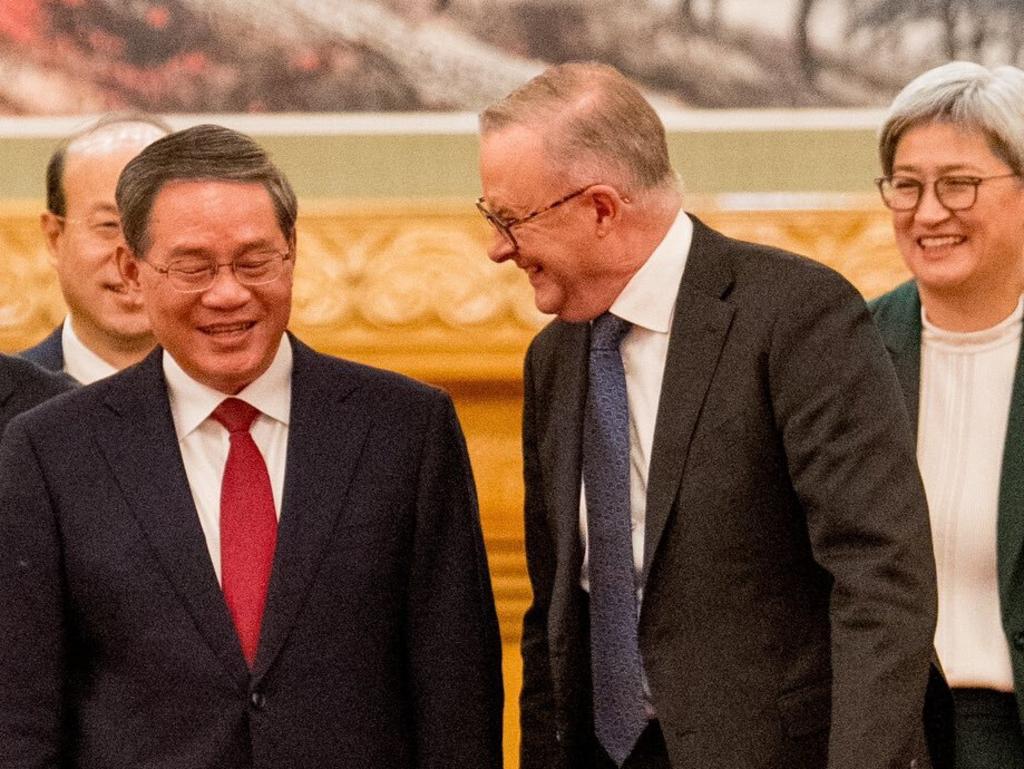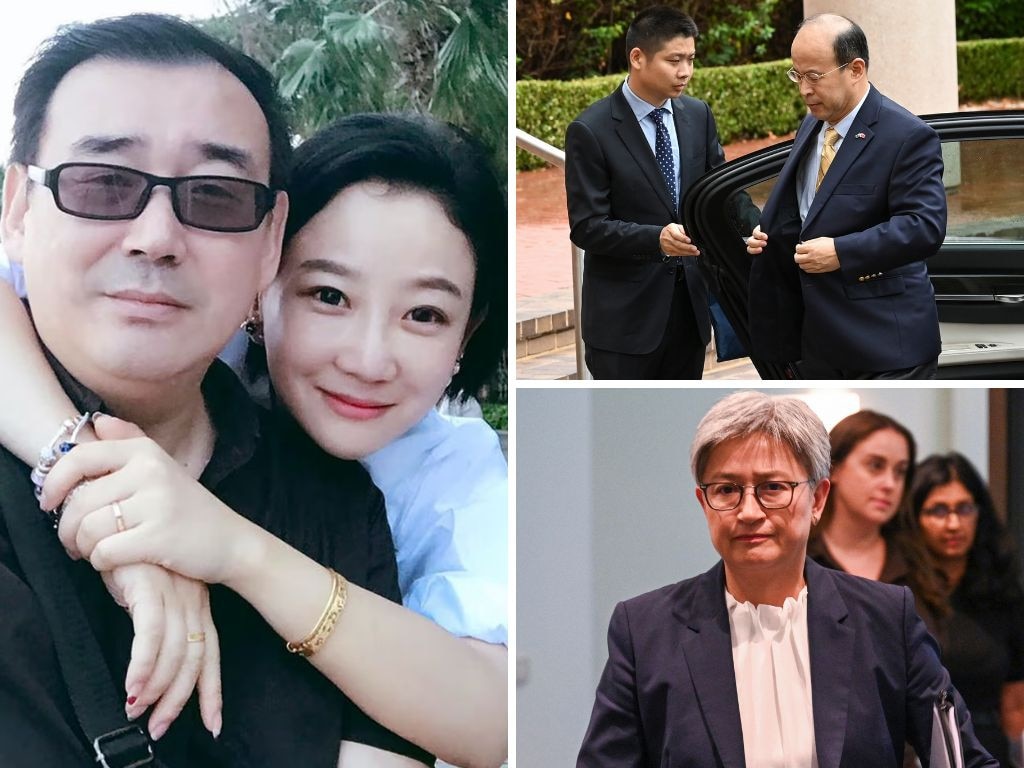Beijing winning psychological war against Albanese government
Yang Hengjun’s death sentence is yet another capricious atrocity as Beijing tries to re-educate Canberra about its place in the world.

It also sentenced the Albanese government to diplomatic confusion and political uncertainty, calling into doubt its only remaining foreign policy achievement – stabilising the Australia-China relationship.
The death sentence is best seen as part of Beijing’s psychological warfare.
Yang’s sentence can be commuted to life imprisonment, provided he commits no offences in the next two years. What possible offence could he, gravely ill now, commit in prison?
It’s not the first time Beijing has used the threat of executing Australian citizens to gain leverage over Canberra. Beijing treats Australia as it would a prisoner in its “residential detention” system, alternating harsh, sudden punishments with welcome rewards, to create dependence, timidity, fear and paralysis in the prisoner.
One minute, Australian broadcaster Cheng Lei is released after three years in jail on ludicrous charges of revealing Chinese state secrets. The nation rejoices. Then a Chinese navy vessel off the coast of Japan directs dangerous sonars against Australian navy divers from HMAS Toowoomba, breaching maritime law and injuring the Australians – and then, preposterously, blames the Japanese.
Beijing continues with the progressive lifting of baseless trade sanctions against Australia. Canberra is overjoyed. Exporters eye their big profits.
And then the death sentence is imposed on another Australian in jail for an implausible crime he allegedly committed 28 years ago in Hong Kong.
This suggests a lot of trouble ahead for Canberra, which will face more punishments, some of which could be intensely challenging.

So far, Beijing is slowly prevailing in this battle of will and wits. It looks likely that Canberra will persist in the invitation for the Chinese Premier, Li Qiang, to visit this year. How can the Great Hall of the Parliament host gushing speeches and lavish cliches for the head of a government threatening to kill an innocent Australian?
Of course, if Yang remains in prison for years, it wouldn’t be reasonable never to host a Chinese leader. But beyond Hang’s basic human rights, there’s the matter of national dignity.
Is Australia so abased that one day of strongly worded diplomatic statements is the limit of our effort to protest Dr Yang’s treatment?
What is Anthony Albanese doing?
Justin Bassi, head of the Australian Strategic Policy Institute, suggests Canberra should follow Canada’s lead and secure a joint statement from our key allies protesting Yang’s treatment, like the 2021 Declaration Against Arbitrary Detention. But so far there’s no sign the Albanese government will allow the death sentence to influence the bilateral relationship at all. There’s no sign of work towards an international statement, the Australian ambassador was not temporarily called home for consultations, a standard way to indicate diplomatic displeasure.
Yang’s case has its distinctiveness, but that’s no reason to see it as other than an act of intimidation.
Yang worked for China’s Ministry of State Security, first as an operative in Hong Kong under cover of an academic job, then in the US, also under an academic cover. However, he didn’t do anything very notorious in either location. The Chinese government let him resign from the ministry in the late 1990s and the Americans welcomed him back as a legitimate academic some years later.
He lived for years between America, Australia and China. Yang’s then wife came to Australia as a skilled migrant. He then joined her. According to his good friend and former academic supervisor Feng Chongyi of the University of Technology in Sydney, it was partly because Yang spent so much time in China that his first marriage broke down.
Yang was a social media activist, blogger and writer. He was critical of the Chinese government, but thought this was well within tolerable limits. He then stopped all critical activity and promoted his online novels. At the end of an academic fellowship in the US, he went back to China in 2019 to farewell friends and family. He miscalculated badly. Chinese political and social repression severely intensified throughout the past decade, especially after 2018, when China’s President, Xi Jinping, had the constitution amended to end presidential term limits. Yang’s friend Feng was himself detained for a week on equally ludicrous suspicion of espionage and was very lucky to be released. He warned Yang not to go back.
Yang was arrested at Guangzhou airport in January 2019 and has been in custody ever since. He’s had consular visits from Australian diplomats, though these dried up during Covid. But contrary to Canberra’s consular agreement with China, no Australian official attended his trial.
There are different possible interpretations of Yang’s death sentence. Beijing has become much more savagely repressive and authoritarian. You only need to read the reports of Human Rights Watch, China Watch or Freedom House to see this process detailed.
Over the past six months, Chinese authorities have stepped up a hysterical campaign against espionage and treachery.
Beijing’s crime du jour
Many Western analysts routinely fail to understand China because they won’t take communist ideology seriously. But all communist cultures typically have a “crime du jour”, which is used as a pretext for punishment. In the first decades of any communist regime, this is typically ideological deviationism, then corruption. All communist societies, lacking free media and independent courts, are fantastically corrupt. Over the past six months, the crime du jour has been treachery and espionage. So it’s possible Yang was simply a victim of China’s intensified repression.
But there are many counter indicators. Shortly before Yang’s arrest, Australia, on ASIO advice, revoked the residency of Chinese billionaire Huang Xiangmo. ASIO believed Huang was at the centre of foreign influence operations involving then Labor senator Sam Dastyari. Beijing detests Australia’s laws against foreign interference. China, Russia and a couple of other authoritarian nations have a reputation of savage retaliation for actions against their intelligence or political operatives that becomes public. This is one of many reasons foreign diplomats who are caught in acts of espionage are often expelled quietly rather than publicly.
The retaliation is mostly not against any Australian intelligence officer or government official, but just some randomly chosen innocent Australian who happens to be visiting.
Beijing sets up disincentives for strong action by democracies at every point. So Yang could have been imprisoned in retaliation for Australian actions Beijing dislikes.
This turns, too, partly on the contradictory interpretation Beijing has of the period of frozen relations for most of the life of the Morrison government and the newly stabilised relationship under Anthony Albanese. A typical Australian view, echoed in Anglosphere publications like The Economist, is that Canberra stood up heroically to Beijing’s bullying.
Beijing saw that its actions were counter-productive and moved back to more normal diplomatic behaviour. Beijing’s view is almost the exact opposite. It believes that it taught Canberra a severe lesson. Australia showed it understood the error of its ways by throwing out Morrison and electing a more pro-China government, a government willing to drop most public criticism of Beijing and undertake various gestures of repentance. As a result, Beijing has provisionally readmitted Canberra into a relationship with the People’s Republic but will still administer many slaps across the face to help Canberra further reform its attitude.
The idea Yang’s case is independent of a decision to intimidate and humiliate Australia just relies on too many far-fetched coincidences of timing. Yang was convicted a long time ago, though this was never announced. The timing of the announcement was discretionary. It certainly required approval at the highest levels in Beijing. It was an astonishingly severe penalty for a non-existent crime. If Yang had been remotely suspected of any wrongdoing nearly 30 years ago, he would not have remained at liberty for nearly three decades while he lived in and out of China.
Not only that, Beijing has used this kind of death threat in the past. In 2017, the Turnbull government, in one of its few missteps in foreign policy, tried to get parliamentary ratification for an extradition treaty with China that had been foolishly signed in the last days of the Howard government, but never progressed towards ratification.
‘The Albanese government seems to have given up altogether any effort to provide the Australian people a full narrative about China.’
The idea that Australia could ever have an extradition treaty with a communist government with a completely rigged legal system, and which makes huge efforts to manipulate, control and intimidate its diaspora community in Australia, was gravely mistaken.
Labor, under Bill Shorten, rightly opposed ratification and several Liberals threatened to cross the floor. The government abandoned ratification. Turnbull writes enlighteningly of this episode in his memoir, A Bigger Picture: “Although it never came up in leaders’ discussions, we had every reason to believe that a failure to ratify the extradition treaty would make it harder for us to ensure that China did not impose the death penalty on Australian citizens convicted of capital offences.”
In fact, the intimidation, though not verbalised at leaders’ level, was far cruder than that. Several ministers made the threat to Australian lives in China a part of their private advocacy for ratification. One or two ministers – not Turnbull or foreign minister Julie Bishop – were dumb enough to make a version of the argument in public.
Albanese, Foreign Minister Penny Wong and Defence Minister Richard Marles all made appropriate statements saying how much they deplored Yang’s death sentence. But that seems to be more or less it. Beijing would be perfectly happy with this. Increasingly, Australia is compliant. The Albanese government seems to have given up altogether any effort to provide the Australian people a full narrative about China. It’s notably not doing anything much at all in defence, or even planning to produce significant new capabilities in the next decade.
Beijing has not broken the US-Australia alliance, but it can be well pleased with the success of its intimidation mixed with diplomacy.
One reason Beijing abandoned the excesses of its wolf-warrior diplomacy style was to create the political space for its Australian fellow travellers to become active again. For the most part, they’ve fully obliged, managing to blame either Scott Morrison, or the Americans, for Beijing’s behaviour and calling always for mealy-mouthed equivocations to be our only tool of national policy. Part of the Albanese government’s failure here arises from the very unsatisfactory way our political culture has managed the politics of the 1.3 million-strong population of Australians with Chinese heritage. These have been wonderful migrants. They are a diverse population, with ethnic Chinese not only from mainland China but from Taiwan, Hong Kong and all over Southeast Asia.
Morrison and some of his ministers overdid the rhetoric on China, failing properly to distinguish between the PRC government and Chinese people, foolishly and airily talking about war.
Labor campaigned among Chinese Australians to the effect that the Liberals were prejudiced against Chinese people and would lead Australia into needless war against their families.
The Chinese government is extremely active in the diaspora community. One of its central efforts is to blur any distinction between the Chinese state and ethnically Chinese people anywhere in the world. It used social media to amplify Labor’s message. Ethnic Chinese voters showed a strong preference for Labor at the last election.
This now puts the Albanese government in a straitjacket. In the lead-up to the Aston byelection, the then Victorian premier Daniel Andrews travelled to China without any mainstream Australian journalists but his party communicated with furious energy on Chinese social media sites popular with Chinese Australians.
Senator Wong wrote to Aston electors, in a letter that was also translated into Mandarin, pointing out the Albanese government “is rebuilding our international relationships – we are engaging with key trading partners”.
The Albanese government, though doing well enough in the polls at the moment, is terrified of losing its voting edge with the Chinese diaspora. Its appeal to the diaspora is that it has succeeded in stabilising the China relationship. That makes it a political hostage to this stabilisation and furnishes huge leverage to Beijing. That’s why it won’t criticise Beijing unless the Chinese government’s actions are so outrageous that it can’t credibly avoid doing so.
Mike Green of the US Studies Centre, one of the leading US analysts on Asia, thinks Beijing is committed to some moderation this year in its relationship with the US, mainly because it is worried about restrictions on exports and access to certain technology. However, Green judges that Beijing’s military aggression will proceed independently of this diplomatic moderation, and therefore there’s every chance of a nasty surprise.

Australian academic John Lee agrees, adding that while Beijing, suffering a slowing economy, is worried about access to US and European markets, this will have no beneficial effect on the way that it treats regional nations such as Australia.
Beijing doesn’t like AUKUS, though nothing of consequence is happening with AUKUS for many years, and it doesn’t like the increased US military presence in Australia. But there’s almost nothing else the Albanese government is doing that gives Beijing the slightest pause. The Albanese government has been weak on Israel, monstrously negligent in its inability to send a navy ship to the Red Sea, weak in its support of Ukraine, and is producing nothing in Australian military capability.
This has every Australian strategic hardhead deeply worried.
Former deputy prime minister John Anderson tells Inquirer: “The recent extraordinary sentence of death imposed on an Australian by the Chinese Communist Party should be a powerful reminder of the privilege of living in a society in which the state doesn’t determine what’s right and wrong because it has the unchecked power to do so.
“The world is becoming less stable, less predictable and more dangerous. Yet almost every day we learn of bungled acquisitions, lost or cancelled capabilities, lack of essential personnel (even to man the frighteningly modest Royal Australian Navy) and a mind-boggling lack of urgency around supply-chain security.
“Nor is it acceptable to presume that the Americans will do it all for us. Using AUKUS, which remains a great hope, but nothing more as yet, as a smokescreen for running down our already weak capabilities is the antithesis of the leadership we need.”
Anderson was a National Party leader. But these are not party political sentiments. No one can be happy about the weakness at the heart of Australian strategic policy today. Well, almost nobody.








A Chinese court sentenced Dr Yang Hengjun, an Australian citizen, to death, with the sentence suspended for the moment.